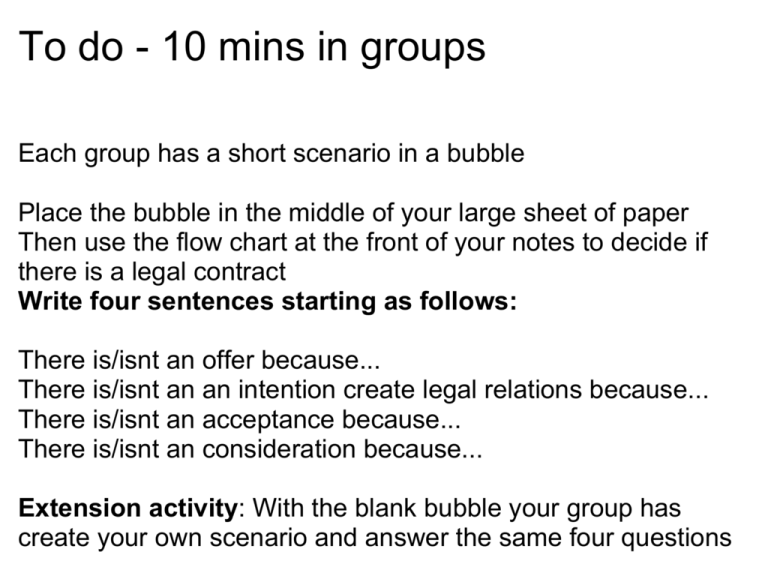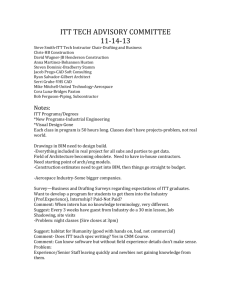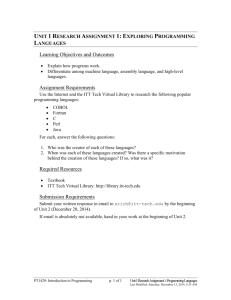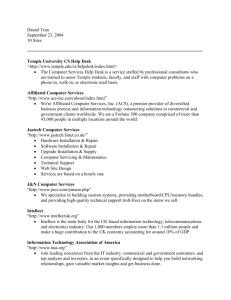offeritt - A Level Law
advertisement

To do - 10 mins in groups Each group has a short scenario in a bubble Place the bubble in the middle of your large sheet of paper Then use the flow chart at the front of your notes to decide if there is a legal contract Write four sentences starting as follows: There is/isnt an offer because... There is/isnt an an intention create legal relations because... There is/isnt an acceptance because... There is/isnt an consideration because... Extension activity: With the blank bubble your group has create your own scenario and answer the same four questions Offer An offer is a statement of the terms upon which the person making the offer is willing to enter a contract: it can be written or verbal. Offer simple definition: What a person says he will do in the contract and for what reward (money/goods) •The offer must be communicated to the other party. •Unless a person knows about an offer it has no effect. •This is because the person cant make any decisions about the offer •An offer can only be accepted while it is open •Once the offer has ended it cannot be accepted •So it cannot be the basis of a contract •The important point is to establish how long the offer lasts Cases that are regarded as offers • Thornton v Shoe Lane Parking • C was entering a car park via an automatic barrier. Mr Thornton put money in a machine to open the barrier and was given a ticket. • The offer is made by the owner of the machine and that it is the buyer from the machine who accepts the offer and makes the contract come into existence • You cant negotiate with a machine! • Chapleton v Barry • The claimant hired a deck chair from Barry UDC for use on the beach. There was a notice on the beach next to the deck chairs stating that the deck chairs could be hired at 2d for three hours and also 'respectfully requested' the public to obtain tickets issued by the chair attendants. • The offer was the notice next to the pile of deckchairs. • Where there is no attendant to negotiate with then a sign or even the deckchair can be the offer if this is the custom with this type of sale. What is and isnt an offer •There are certain situations where what is made to the other party is the start of negotiations. •Any communications regarded as negotiations are NOT an offer. •Negotiations are called an Invitation to treat. •An Invitation to treat is merely an indication of a willingness to enter negotiations. •But an offer is a statement that a person is willing to enter into a legal contract. Invitation to Treat (ITT) • Is not an offer but classed as negotiations • Advertising of products/services usually an ITT • ITT exists because of the following: 1. Limited stock of the item 2. The item may have legal restrictions on its sale 3. The seller may wish to choose who purchases the product 4. The seller may wish to negotiate the price, e.g. on ebay or newspaper advert 5. The seller may wish to decide on whether or not he sells the product at all ITT cases • Partridge v Crittenden • Fisher v Bell • D placed an advert in a • The defendant had a flick classified section of a knife displayed in his magazine offering some shop window with a price bramble finches for sale. S.6 tag on it. Charged with an of the Protection of Birds Act offence where it was a 1954 made it an offence to offer such birds for sale. crime if flick knives were “offered for sale” • Not an offer, ITT, due advert in newspaper meaning may be • Not an offer as seller may many buyers and limited decide whether or not to stock. sell the item. ITT Cases • Gibson v Manchester CC • A letter from the council about selling a council house to Gibson said “The Corporation may be prepared to sell the house to you at the purchase price of £2,180” • The word “may” was held to indicate an ITT as for an offer to exists it must be clear the person making it wishes to enter into a legally binding contract. • Pharmaceutical Society of GB v Boots • Boots had a self service system where the customer would pick the product and take it to the till for purchase. Some items needed a pharmacist present and this was not always the case. In such circumstances the customer could not purchase until a pharmacist was available. • The goods on the shelves were an ITT and the customer made the offer at the till due to legal restrictions on the sale of some items. ITT Case • Harvey v Facey • Harvey sent a Telegram to Facey which stated: "Will you sell us Bumper Hall Pen? Telegraph lowest cash price-answer paid;" Facey replied by telegram:"Lowest price for Bumper Hall Pen £900." Harvey then replied:"We agree to buy Bumper Hall Pen for the sum of nine hundred pounds asked by you. Please send us your title deed in order that we may get early possession." • This was an ITT as it was regarded as a request for further information. Harvey had not answered the question as whether or not he would sell the farm so no clear offer. Task In the groups of three: Complete the activity three on page 38 Write your answers on the white board You have 15 minutes.





